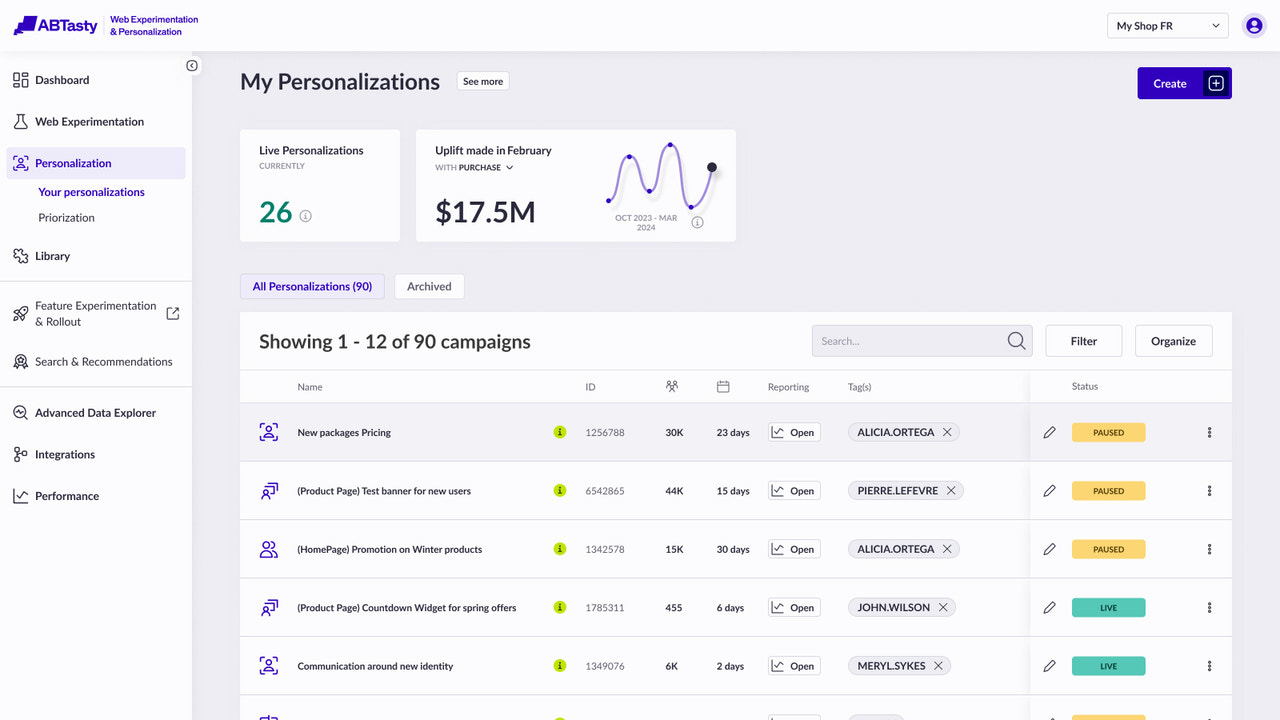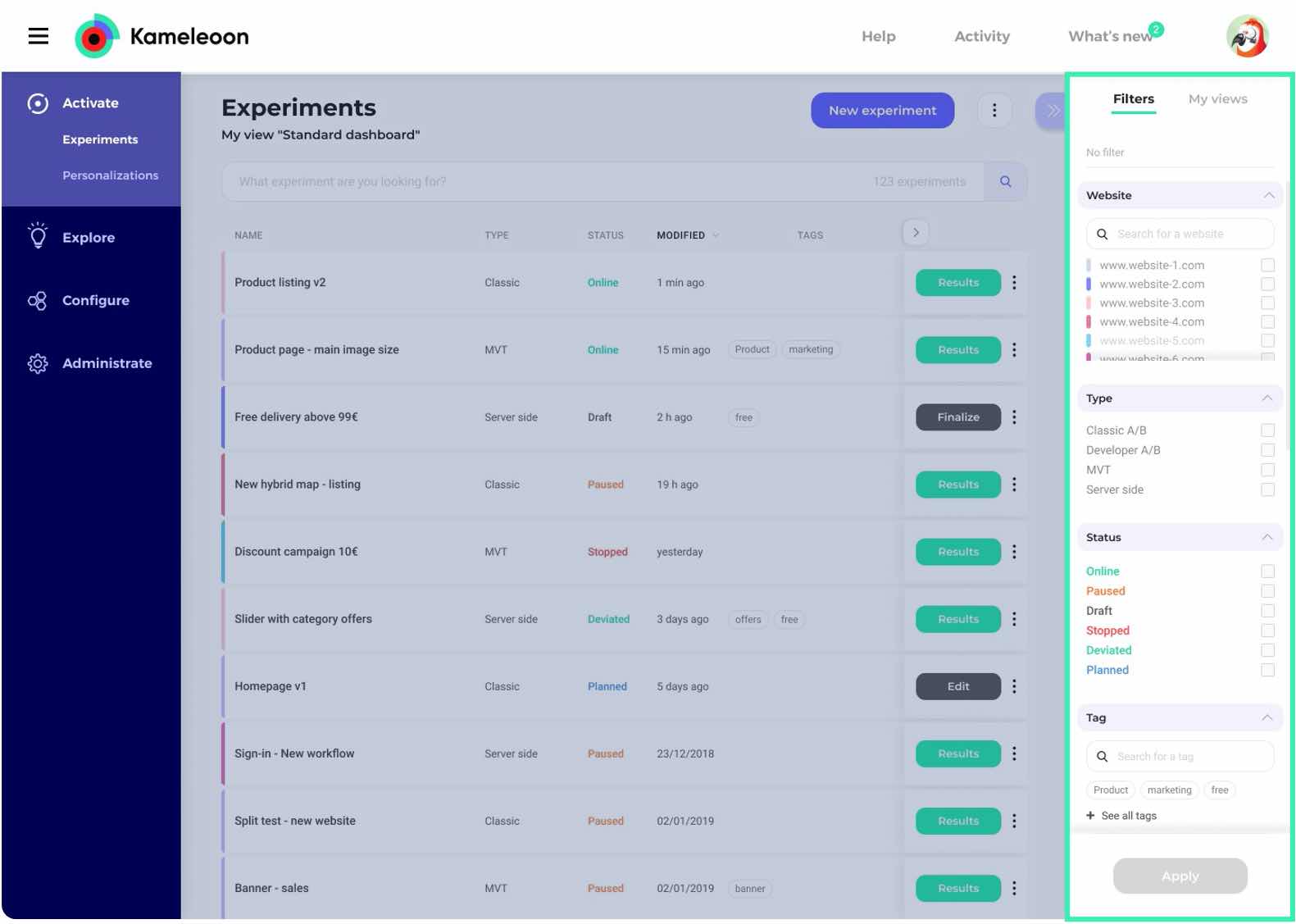Alternatives to Bloomreach Discovery
1. AB Tasty
+Pros
- EmotionsAI Differentiation: Unique emotional behavioral segmentation derived from eight years of behavioral research .
- No-Code Implementation Accessibility: Visual Editor Copilot enables campaign creation through natural language commands .
- Enterprise-Grade Support & Reliability: Dedicated customer success managers for enterprise accounts .
- Technical Performance Advantages: 2.3KB smaller tag size than VWO and 5.7x faster campaign updates than legacy competitors .
-Cons
- Mobile Optimization Gaps: Limited mobile tracking functionality .
- Advertising Platform Integration Deficits: Missing native Google Ads and Display & Video 360 integration .
- Implementation Complexity for Legacy Systems: Legacy CRM incompatibility extends deployments by 3-6 months .
- Algorithm Transparency Concerns: 'Black-box' algorithm concerns .
- Premium Pricing Barriers: Enterprise-level investment required for comprehensive AI capabilities .
One highlighted feature and why it's amazing
The platform's flagship capability segments visitors based on emotional behavioral patterns derived from eight years of behavioral research . This technology identifies visitors driven by immediacy needs, competitive comparison tendencies, or safety concerns, enabling personalized experiences that align with underlying purchase motivations .

Another highlighted feature of why it’s amazing
AB Tasty's AI-assisted campaign building allows marketing teams to create optimization tests through natural language commands such as 'make button green' . This capability addresses technical skill gaps that often limit conversion optimization initiatives, enabling non-technical team members to implement sophisticated testing scenarios without coding requirements.
2. Kameleoon AI Copilot
+Pros
- Unified web and feature experimentation platform that distinguishes it from competitors focused on single-channel optimization.
- AI Opportunity Detection represents a proven capability for extracting hidden value from underperforming tests, with documented 15% average uplift recovery from tests initially classified as "losing".
- GDPR-compliant behavioral prediction capabilities provide particular value for European retailers facing strict privacy regulations.
- Vendor support quality emerges consistently as a key strength, with 4.5/5 G2 satisfaction scores and customer testimonials emphasizing responsive support teams and dedicated account management.
-Cons
- Implementation complexity requiring either substantial internal technical expertise or significant vendor support investment.
- Technical dependencies require 100,000+ visitor data points and 7+ day model calibration periods, limiting effectiveness for lower-traffic retailers and extending implementation timelines.
- Pricing accessibility limits adoption to mid-market and enterprise retailers, with $15,000+ monthly investment thresholds making the platform cost-prohibitive for SMBs with less than $1M revenue.
One highlighted feature and why it's amazing
Automates test variation creation through machine learning-powered hypothesis generation, reducing ideation-to-execution time by a claimed 40%.

Another highlighted feature of why it’s amazing
Identifies high-conversion audience segments using behavioral data analysis, requiring 100,000+ visitor data points and 7+ days for model calibration.
Other Alternatives
Optimizely Web Experimentation
Shogun Page Builder
SiteSpect
Unbounce
VWO
How We Researched This Guide
About This Guide: This comprehensive analysis is based on extensive competitive intelligence and real-world implementation data from leading AI vendors. StayModern updates this guide quarterly to reflect market developments and vendor performance changes.
213+ verified sources per analysis including official documentation, customer reviews, analyst reports, and industry publications.
- • Vendor documentation & whitepapers
- • Customer testimonials & case studies
- • Third-party analyst assessments
- • Industry benchmarking reports
Standardized assessment framework across 8 key dimensions for objective comparison.
- • Technology capabilities & architecture
- • Market position & customer evidence
- • Implementation experience & support
- • Pricing value & competitive position
Research is refreshed every 90 days to capture market changes and new vendor capabilities.
- • New product releases & features
- • Market positioning changes
- • Customer feedback integration
- • Competitive landscape shifts
Every claim is source-linked with direct citations to original materials for verification.
- • Clickable citation links
- • Original source attribution
- • Date stamps for currency
- • Quality score validation
Analysis follows systematic research protocols with consistent evaluation frameworks.
- • Standardized assessment criteria
- • Multi-source verification process
- • Consistent evaluation methodology
- • Quality assurance protocols
Buyer-focused analysis with transparent methodology and factual accuracy commitment.
- • Objective comparative analysis
- • Transparent research methodology
- • Factual accuracy commitment
- • Continuous quality improvement
Quality Commitment: If you find any inaccuracies in our analysis on this page, please contact us at research@staymodern.ai. We're committed to maintaining the highest standards of research integrity and will investigate and correct any issues promptly.